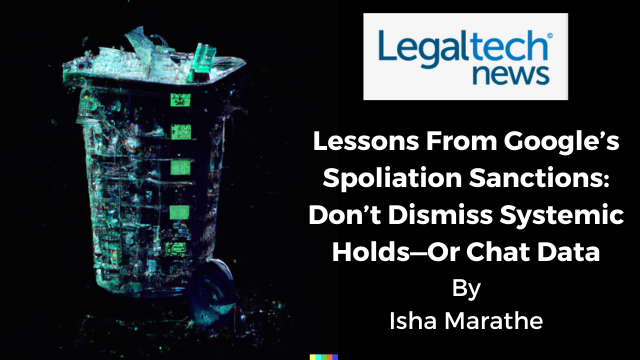Leaving all the responsibility to individual custodians, and assuming data is the same everywhere, won’t likely resonate well in today’s modern e-discovery disputes

Last week, Federal Judge James Donato ruled that Google neglected to preserve chat evidence that was under a legal hold, and that the company knew better. As a result, the judge approved spoliation sanctions against the tech giant.
The plaintiffs in the multidistrict litigation case, Google Play Store Antitrust Litigation in the U.S. District Court of the Northern District of California, first noted the absence of Google’s internal chat messaging data back in April 2021. Google responded in October 2021 stating that all internal Google chats are typically auto-deleted within 24 hours, and that the company had stayed true to that schedule in spite of the MDL legal hold.
Because assumptions to the contrary, it’s not “free” to mount a broad systemic hold, and the more you hold, the greater the volume of data that may ultimately be required to be ingested, processed, searched and reviewed. So, you don’t keep everything for everybody; you keep what you should reasonably anticipate to be relevant when held by those you should reasonably anticipate to have been involved in the events under scrutiny, or hold responsive information.
Craig D. Ball, Texas attorney and forensic expert
In lieu of a systemic pause on deletion, however, Google handed the reins of chat history preservation over to the individual custodians, directing them to make the best possible decision, according to the filing. What’s more, the company preserved far more emails than it did chats, raising eyebrows from the bench.
When the plaintiffs rebutted in 2022 with a motion for sanctions, the investigation led to what e-discovery experts told Legaltech News is the crux of today’s preservation tightrope: Is a systemic hold better than a custodial hold? What’s more—with proliferating ESI and the growing use of collaboration apps, can the two truly be separated from one another?
Craig Ball, a Texas attorney and forensic expert, is an advocate for a combination of both preservation strategies in tandem. In fact, he stressed that a blanket systemic hold can be “lazy and wasteful.”
“Because assumptions to the contrary, it’s not “free” to mount a broad systemic hold, and the more you hold, the greater the volume of data that may ultimately be required to be ingested, processed, searched and reviewed,” Ball said. “So, you don’t keep everything for everybody; you keep what you should reasonably anticipate to be relevant when held by those you should reasonably anticipate to have been involved in the events under scrutiny, or hold responsive information.”
Read the entire analysis, also quoting former U.S. Magistrate Judge Andrew J. Peck, here.


